|
October 4, 2018
Workers Across the Country Fight for
Their Rights
Workers from Across Canada Help
D-J Composites Workers in Newfoundland Block Entrance to Scabs
PDF

Workers block scabs at D-J Composites, September 29, 2018.
Workers Across the Country Fight for Their Rights
• Workers from Across Canada Help D-J
Composites Workers in Newfoundland Block Entrance to Scabs
• Quebec Liquor Board Workers Vote for New 18-Day
Strike Mandate
• Railway Workers' Fight for Their Health and
Safety and that of the Public
• Ontario Injured Workers Decry Measures Taken on
Their
Backs
For Your Information
• Reverse WSIB's Premium Rate Reduction for
Employers - Ontario Network of Injured Workers Groups
• Workers' Organizations Denounce Premium
Reduction
Workers Across the Country Fight for
Their Rights
Workers from Across Canada Help D-J Composites
Workers in Newfoundland Block Entrance to Scabs
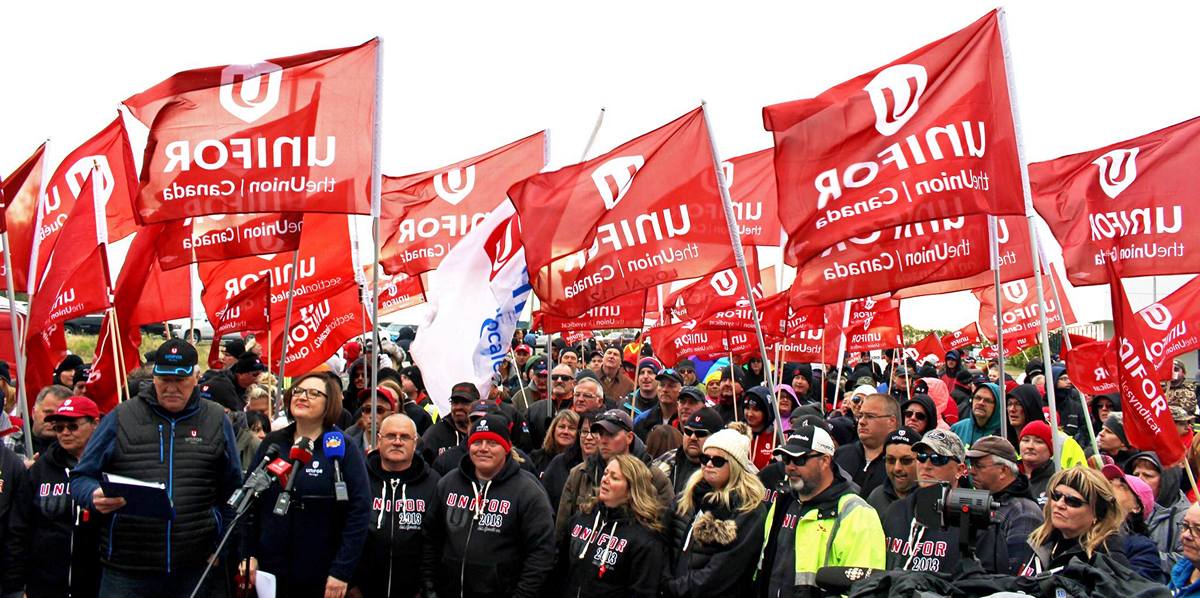
Rally at D-J Composites, Sepember 26, 2018.
Since September 26, hundreds of union activists and
supporters have turned the tables on the managers and scabs at a Gander
Aerospace facility where 30 Unifor members have been locked out by the
U.S. owners since December 2016. Hundreds of activists from across
Canada have surrounded the building and erected a temporary fence to
keep scabs and managers from returning to work. The union is also
running a social media campaign and newspaper ads, asking the public to
write and call the Premier of Newfoundland and Labrador to intervene to
force D-J Composites to sign a contract that is acceptable to the
workers. On October 3, Unifor announced that D-J Composites has
consented to binding arbitration to resolve the lockout after a meeting
with the Premier of Newfoundland-and-Labrador Dwight Ball.
"We are so happy to see the support shown by union members across the
country who have come to Gander to stand with us," said Ignatius Oram,
Unifor Local 597 Unit Chair. "This American employer thinks they can
bust the union, but we won't ever quit."
 D-J Engineering, based in
Kansas, U.S., owns D-J Composites. It has been found guilty twice by
the Labour Relations Board of bad faith bargaining and ordered to stop
its attempt to eliminate seniority-based rights at the plant, but it
has refused to abide by the rulings of the Board and the provincial
government has done nothing to force
the company to do so. These are clear union busting tactics, the
workers
are saying, which must not pass. D-J Engineering, based in
Kansas, U.S., owns D-J Composites. It has been found guilty twice by
the Labour Relations Board of bad faith bargaining and ordered to stop
its attempt to eliminate seniority-based rights at the plant, but it
has refused to abide by the rulings of the Board and the provincial
government has done nothing to force
the company to do so. These are clear union busting tactics, the
workers
are saying, which must not pass.
D-J
Composites'
"offer"
is
aimed at eliminating seniority, gutting
wages and dividing the workers.
"As
workers
we
have
made
it clear from the beginning that we are not
prepared to turn over control of our wages to the employer through a
proposed pay system that creates wage uncertainty, and opens the door
to potential wage cuts on an annual basis." Oram said. "In addition,
the company had made clear, they intend to lay off up to a third of the
workforce, but has refused to identify who would be laid off. It is
ridiculous to expect a worker to cast a ballot not knowing if you will
have employment under the company's offer."
The
owners
are
refusing
to
discuss with the union. Instead, D-J Composites
turned to the courts. Using an injunction obtained in 2017 they
are demanding that the courts again prevent picketers from blocking
access to the plant.
Workers
are
determined
to
force
the company to sign a collective agreement that
shows them the respect which is rightfully theirs.

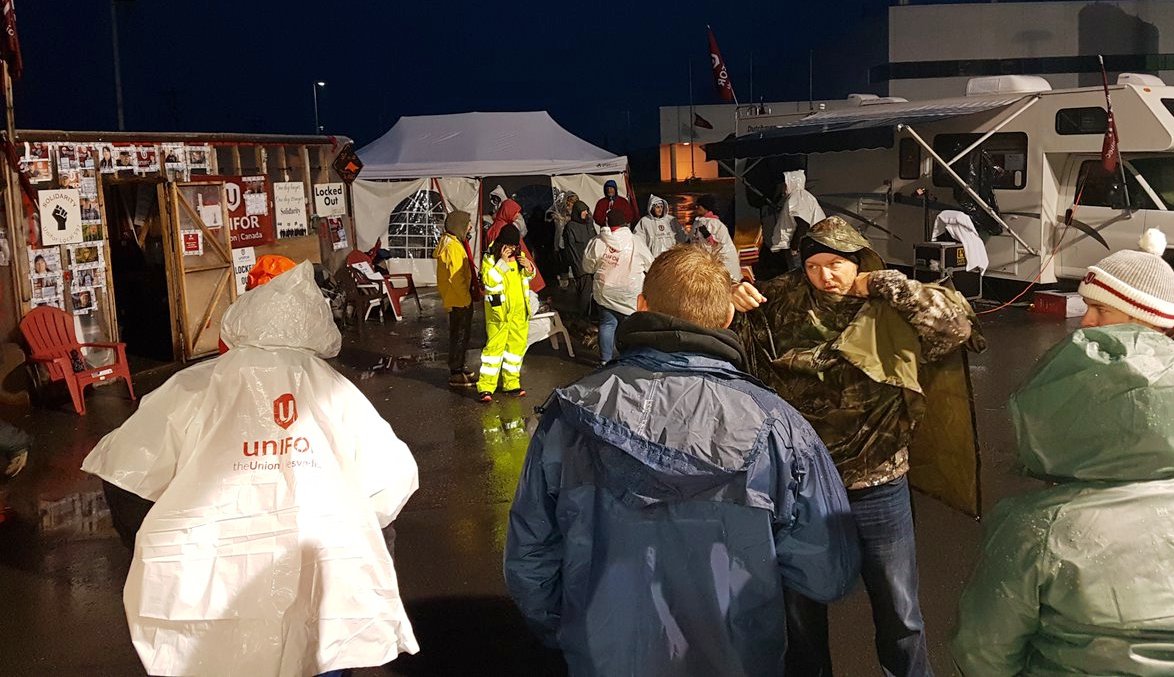 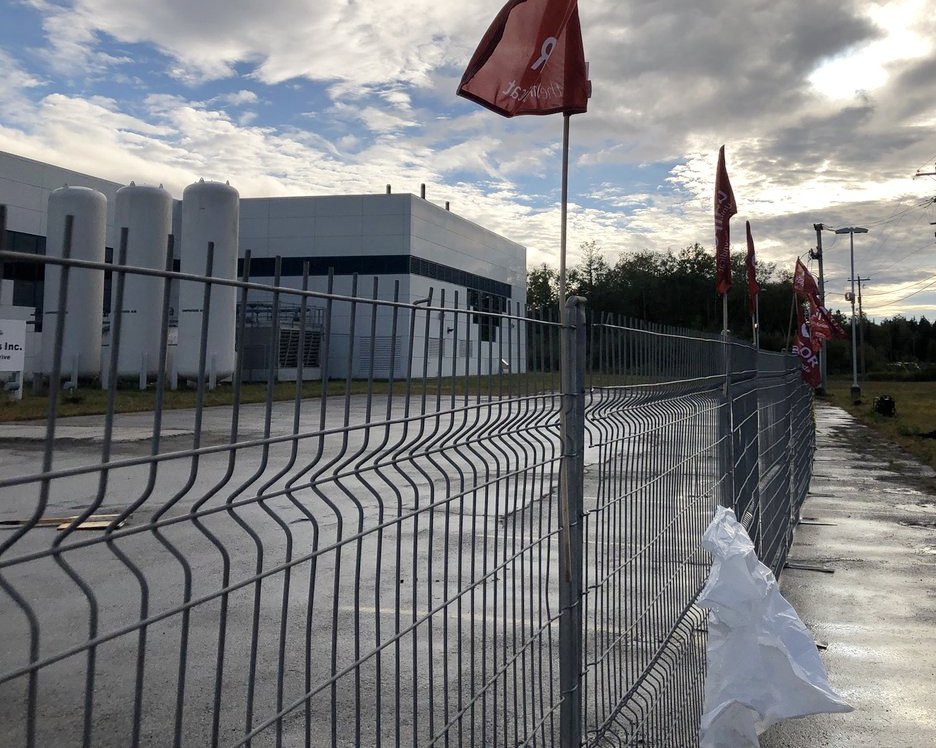
Hundreds of workers and 1,000 feet of fencing erected by the union,
surround D-J composites
plant, preventing scabs from entering.

Quebec Liquor Board Workers Vote for
New 18-Day Strike Mandate
Over 2,500 retail and
office workers at the Quebec Liquor Board (SAQ) held a general
membership meeting on September 28, at the Olympic Stadium in
Montreal. They voted 96 per cent in favour of a new 18-day
strike mandate to be used when the union deems necessary. They are
demanding
that those in control of the SAQ sign a
collective agreement acceptable to those who do the work.
Workers previously voted for a six-day strike mandate
and have so far used five of those days. The new strike mandate was
approved following a negotiation blitz with SAQ executives which ended
in
failure.
The workers' demands include an across-the-board wage
increase necessary to reach a modern standard and an end to precarious
working conditions. Close to 70 per cent of the 5,500 SAQ
workers are stuck in part-time irregular work, sometimes with only
a couple of hours of work per week. They are often only notified of
their schedules at the last minute.
Workers are particularly angry at the company's wage
offer that does not even compensate for concessions the SAQ executives
have already demanded, leaving workers in poverty and without the
dignity they deserve. The arrogance of the corporation is such that
instead of addressing the central issue of irregular work and poverty
wages, they want to intensify the attack on workers' stability and
peace of mind with increased weekend shifts.
The present collective agreement expired on
March 31, 2017, yet those in control of the company want only
to delay and pressure workers into accepting even worse working
conditions under the threat of privatization. The new 18-day
strike mandate expresses the resistance of the workers and their
determination to
have an agreement that addresses their demands.
The workers are also clear that the threat of the
Liberal government, which was defeated in the October 1 election, to
hand over SAQ profits to private interests, will be taken up in earnest
by the new party in power, the Coalition Avenir Québec (CAQ).
SAQ executives are now using the election results to power yet again
the threat of privatization to force the workers to capitulate.
The 18-day strike mandate is a just rebuttal of this intimidation. It
expresses the workers' determination to improve their working
conditions on the basis of an acceptable collective agreement.


Railway Workers' Fight for Their Health and Safety
and that of the Public

A train derailment near Ponton in Northern Manitoba has
killed a conductor and left a locomotive engineer with life-altering
injuries. Through their defence organization, the Teamsters Canada Rail
Conference (TCRC), railway workers are demanding the Chief Medical
Examiner of Manitoba call a coroner's inquest into the
September 15 tragedy.
On that day a Hudson Bay Railway (HBR) train, operated
by two TCRC members, encountered a track failure resulting in the
derailment of the leading locomotive, other locomotives and several
rail cars. The conductor, aged 38, and the 59-year-old
locomotive engineer survived the initial crash but were trapped beneath
hundreds
of tons of wreckage. As a result of the crash, the train, carrying
liquefied petroleum gas, was leaking diesel fuel from the locomotives.
The TCRC reports a most troubling fact. A helicopter
crew coming to pick up a prospector discovered the wreckage of the
train entirely by chance several hours after the derailment. No one at
HBR knew anything about the derailment until the fluke observation by
the helicopter crew. Hours after the accident, with the workers
pinned in the rubble, no one was coming to help them or even aware that
they needed rescuing.
Only after the helicopter crew notified firefighters
and other first responders did they arrive to do their best to save the
two injured men. Firefighters were limited by their rescue equipment
which is not designed to extricate people trapped in hundreds of tons
of
steel. Sadly, the conductor died at the scene. The locomotive
engineer was eventually cut free from the debris and taken to Winnipeg
in critical condition with life-altering injuries.
The TCRC suggests beaver activity may have led to the
track failure. Water buildup from beaver dams is known to weaken
railway tracks causing derailments. The TCRC pointed out that the
previous owners of HBR, the U.S. monopoly Omnitrax, eliminated the
beaver control program. Omnitrax is notorious for creating havoc in
Northern
Manitoba by shutting down the port in Churchill and refusing to repair
the only rail link to the south after it was seriously damaged in
spring floods.
Omnitrax recently sold HBR as well as the Port of
Churchill to a consortium called Arctic Gateway. The TCRC is calling on
the new owners to join them in demanding a coroner's inquest into the
September 15 derailment.
The TCRC states in a letter to the Chief Medical
Examiner:
The people living in the
communities we serve need to know trains are being safely conducted
through their towns and villages. Railroaders -- the members we
represent -- need to have a fundamental faith in the integrity of the
rail system. They need to know that they can depend
on the track actually being there. The families of these workers need
to know that too.
The work that railroaders do
is not simple; there are incredibly long hours and it is a dangerous
profession. Our members, their families and the communities they serve
need to know that when something goes wrong, people will know and help
will be on the way.
A proper investigation is needed to shine a light on
the circumstances leading to the conductor's death and engineer's
serious injuries. This would include the failure of the track and the
lack of a credible way of knowing immediately that an accident has
occurred. The rail workers themselves, and the communities they serve,
are most precious
and deserve answers. The root cause of this tragedy must be found and
corrected.

Ontario Injured Workers Decry Measures
Taken on Their Backs
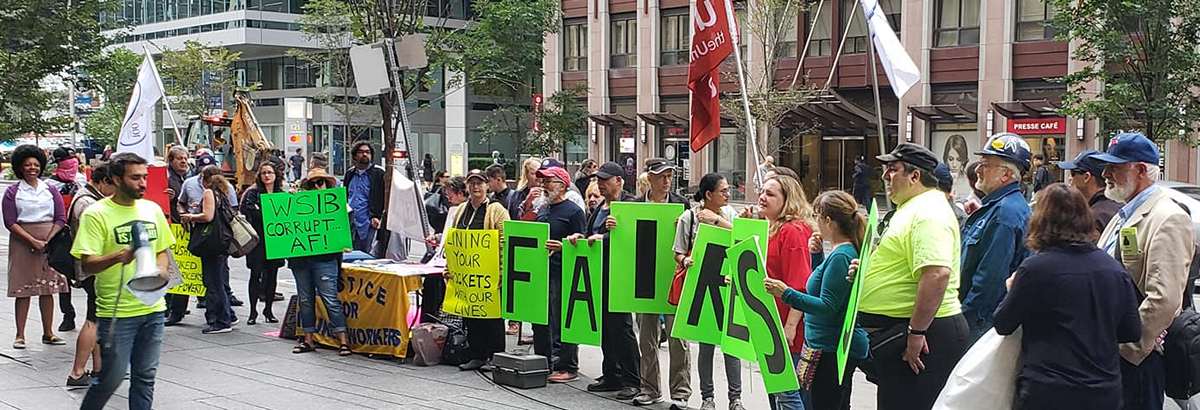
Injured workers picket Workplace Safety and Insurance Board AGM,
Toronto, September 26, 2018.
Since
a
new
Ontario
government
took over, it has declared Ontario "Open for
Business." This is the slogan first adopted by Mike Harris in 1995 when
the anti-social offensive was unleashed with a vengeance provoking a
fight-back led by the unions across the province.
On
September
26
the
Workplace
Safety and Insurance Board (WSIB) in Ontario
used this direction set by the new government to announce that it had
eliminated its "unfunded liability"[1]
ten years ahead of schedule and that, therefore, employers would
receive a massive on-average 29.8 per cent reduction in their premiums
starting in 2019. This means more than $1.5 billion less going into the
compensation system yearly to provide benefits for workers injured or
made ill at work.
The
Labour
Minister
asserted
that
this move is part of the government's
plan to lower taxes. It is "part of our plan to lower taxes, reduce the
regulatory burden, protect and grow jobs, and send a message to the
world that Ontario is open for business," Labour Minister Laurie Scott
declared. This is an irresponsible statement given that the WSIB is not
funded through tax dollars but through employer contributions. It is
part of a historic compromise whereby workers gave up the right to sue
their employers for workplace injuries in return for a public system of
compensation funded through employer contributions.

The Ontario Network of Injured Workers' Groups (ONIWG),
is demanding that the cuts to premiums be reversed and that instead the
money be used to properly compensate injured workers who have been
unjustly denied or cut off benefits in the drive to eliminate the
"unfunded liability."
The OFL, CUPE and other unions have also spoken out
against the employer rebates pointing out the money should remain in
the system to ensure the program adequately provides injured workers
with the compensation they require. This must include covering the more
than one-third of workers in Ontario employed in workplaces that are
not currently covered by workers' compensation.
Despite the "unfunded liability" which has been
presented as an issue since the mid 1980s, from 1996-2001,
Mike Harris' Progressive Conservative (PC) government reduced employer
premium rates by 30 per cent. During the same period the
government was
cutting employer contributions. Its 1997 changes to the Workplace
Safety
and
Insurance
Act, among other things, reduced wage loss benefits
to injured workers by five per cent and WSIB contributions to
permanently injured workers' pensions by 50 per cent, and cut the
cost-of-living adjustment.
Since that time the compensation program has seen
repeated cuts and reductions to payments for injured workers under both
Liberal and PC governments. All of these governments have operated the
WSIB under the same neo-liberal mantra, which is that employers can't
be forced to pay the full cost for the injuries caused in their
workplaces
because this would make them globally uncompetitive.

The concerted drive to reduce the board's liability
began in 2010 under Liberal appointee David Marshall, the board's
president between 2010 and 2015, following a 2009 caution
contained in the report of the provincial auditor that the WSIB should
deal with its $11.4 billion accident fund shortfall. It is the injured
workers who have bourn the burden of eliminating the "unfunded
liability," while employer contributions continue to be reduced -- a
further 10 per cent in the last few years alone.
In 2010, the WSIB issued compensation benefits to
injured workers in the amount of approximately $4.8 billion. By 2017
that figure was cut to $2.3 billion. A 2017
report by the Industrial Accident Victims' Group of Ontario found that
the WSIB had reduced the amount it spent on prescription drugs for
injured workers by one-third between 2010 and 2015. The study
also found that already low acceptance rates for permanent injury
claims dropped by a third, from 9.3 per cent to 5.9 per cent
over the same time period.
The Ford government's cuts to WSIB premiums are a
glaring example of the government's neo-liberal austerity agenda to pay
the rich while cutting funding to social programs. This must not pass!
The demand of injured workers and their organizations is that
employer's rates not be reduced and that the money go instead to justly
compensate all those injured and made ill at work, as is their right.
It is a just demand. The fight of injured workers is the fight of all
Ontario workers.
Justice for Injured Workers!
Stop Paying the Rich, Increase Funding for
Social Programs!
Workers' Comp Is a Right!

Note
1. The "unfunded liability" was
itself a bookkeeping fraud used as a phony justification for cuts to
injured workers' benefits. It is based not on workers' compensation as
an ongoing social program but on an insurance industry model. Private
insurance companies are prohibited from having an unfunded liability in
case they go bankrupt but the WSIB is not a private insurance scheme.
It has a legally-guaranteed revenue source in the form of employer
premiums.
In briefs to Harry Arthurs' 2012 WSIB Funding
Review, injured workers' organizations and other workers'
organizations dismissed as nonsense the notion that the WSIB benefit
obligations need to be funded on a 100 per cent wind-up basis.
They pointed out that the Canada Pension Plan is said to be financially
sound,
even though its obligations are only 28 per cent funded and it has
an unfunded liability of more than $700 billion.

For
Your Information
Reverse WSIB's Premium Rate Reduction
for Employers
- Ontario Network of Injured Workers
Groups -
 
TORONTO, Sept. 28, 2018 (GLOBE NEWSWIRE) The
Ontario Network of Injured Workers' Groups (ONIWG) calls on the
Workplace Safety and Insurance Board (WSIB) and the Ford government to
reverse the $1.45 billion dollar gift to Ontario employers, and
instead put that money towards restitution for injured workers who have
been unjustly denied or
cut off benefits. The 30 per cent reduction to employer premiums
announced on Wednesday [September 26] means less revenue coming into
the system, and
will inevitably lead to a further reduction in compensation provided to
workers who have been injured and made ill on the job.
"Injured workers have already borne the burden of paying
off the WSIB's manufactured financial crisis," said ONIWG President
Willy Noiles. "Since 2010, compensation benefits provided to
injured workers have been slashed by over $2 billion. Almost half
of injured workers with a permanent disability are living at or near
poverty levels. And now that the WSIB is happy with its financial
picture, instead of restitution, the Ford government and the WSIB have
decided to become 'reverse Robin Hoods' and reward employers."

ONIWG has alerted the Ford government of its Workers' Comp Is a Right campaign.
The campaign is based on ensuring that the WSIB listens to injured
workers' own doctors, eliminates cuts due to so-called "pre-existing
conditions," and eliminates the practice of "deeming." This is a
bureaucratic practice of reducing or ending benefits to the
injured by pretending that they are well or have more income than they
actually have.
"With this campaign and the Real Healthcare campaign,
injured workers are reminding the Ford government that workers'
compensation is a right," said Noiles. "It is not charity or a 'burden'
on employers or the province. The rate cut announcement is making a
mockery of the historical compromise at the root of our century old
system of
protection to workers. Ontario's 'government for the people' has
ignored some of the province's most vulnerable."
Injured workers are offended by the idea that
condemning injured workers to poverty will boost the economy of
Ontario. More poverty means more mental stress, and more economic and
social disruption. ONIWG calls on the Ford government to reverse this
"gravy train," and ensure that the WSIB's strong finances be put to
proper use -- to
compensate all those who have been made to suffer by the Board's
austerity measures.
For further information, please contact: Willy
Noiles, 289-219-4473 or visit injuredworkersonline.


Workers' Organizations Denounce
Premium Reduction
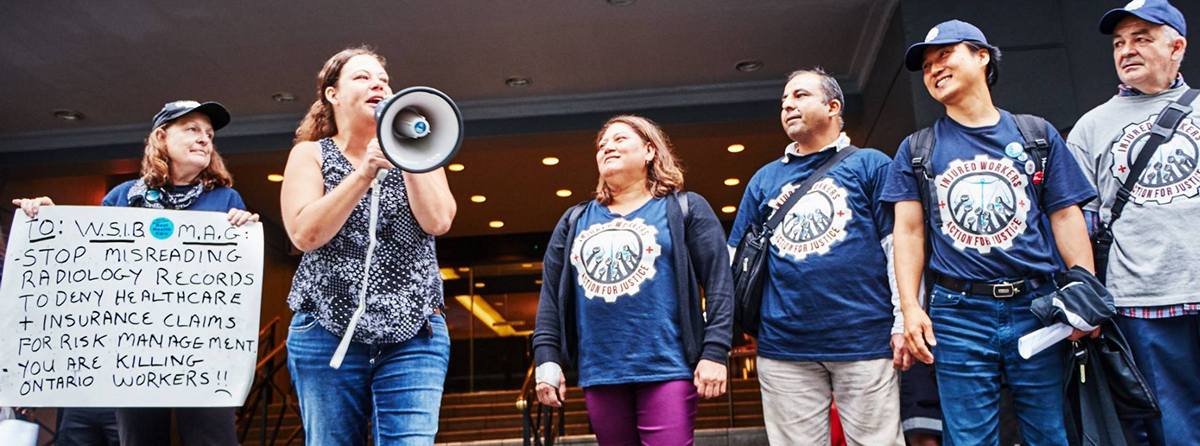
In response to the announcement by the Ontario
government that employer WSIB contributions will be reduced
in 2019, the President of the Ontario Federation of Labour (OFL),
Chris Buckley stated "The WSIB has eliminated its unfunded liability
largely at the expense of benefits to injured workers, ... Today's
announcement of an
additional cut of nearly 30 per cent to employer premiums will
further negatively affect injured workers -- that far too often
struggle to access the benefits to which they are entitled." A
September 26 OFL press release further stated that this action by
WSIB "has the potential to further polarize relations between employers
and workers
in Ontario, instead of fostering cooperation on the prevention of
workplace injuries and diseases, and the sustainable re-employment of
injured workers." It calls on the Labour Minister "to ensure that every
worker in Ontario has universal access to workers' compensation and to
ensure that the prevention of occupational injury, illness and disease
receives the critical attention and funding required to build safer
workplaces."

Fred Hahn, President of CUPE Ontario stated "For too
long Liberal and PC governments alike have failed to support injured
workers with an adequate workers' compensation system,... Benefits paid
out to injured workers have been on the decline for years. Far too many
injured workers are being denied access to benefits of any kind or
aren't
even covered by WSIB in the first place. Thousands of injured workers
are now living in poverty in Ontario. Ford is simply speeding up the
Liberals' work on reducing support to injured workers."
"This is not about saving taxpayers money," said Hahn.
"It is about a government reducing the responsibility of employers for
supporting workers who are injured on the job, forcing the publicly
funded health care system and social services to pick up the slack.
Rather than letting employers off the hook for their responsibilities,
the
government should make sure the WSIB covers all Ontario's workers and
is able to effectively support injured workers for generations to come."

PREVIOUS
ISSUES | HOME
Website: www.cpcml.ca
Email: office@cpcml.ca
|

